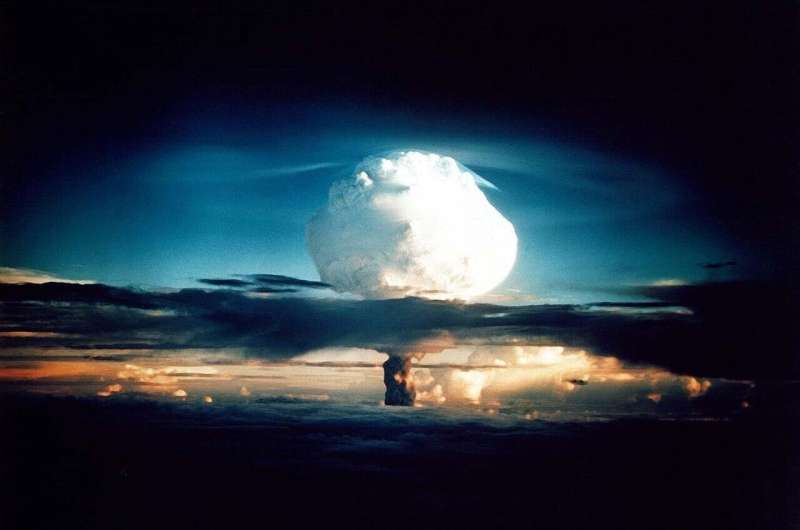Paper highlights the need to prepare for the mental health issues that would follow a nuclear event in Ukraine

Russia’s invasion of Ukraine in February 2022 had disastrous humanitarian consequences, forcing numerous Ukrainians to leave their home and part from their loved ones, while also exposing people of all ages to the destruction, pain and traumas of war. The ongoing conflict will undoubtedly have severe mental health consequences for numerous Ukrainians, yet these could be further aggravated in the occurrence of intentional or accidental nuclear events in Ukraine.
Researchers at Uniformed Services University in Maryland and Musashino University in Japan have recently published a paper exploring some of the mental health-related issues that could arise should a nuclear event take place in Ukraine. Their paper, published in Wiley’s Psychiatry and Clinical Neurosciences, outlines some of the actions that governments and health care systems could take to prepare for the mental health consequences of such an event.
“Regardless of the extent to which radiological exposure ultimately occurs in the conflict in Ukraine, the potential for such events creates significant risk to global health security,” Joshua C. Morganstein, Robert J. Ursano, David M. Benedek, Mie Kurosawa, and Jun Shigemura, the researchers who carried out the study, wrote in their paper. “Health care systems play a critical role in responding to radiological events and must be prepared to address the direct radiological exposure health needs and the mental health concerns, which are significant and complex.”
While Ukrainian citizens are the most impacted by Russia’s invasion, the ongoing conflict is also affecting both neighboring countries and more remote countries that have economic ties to Ukraine. If a nuclear event took place in Ukraine, its mental health-related consequences could impact both the Ukrainian health care systems and health care systems in neighboring countries who are receiving refugees or who might experience fallout from the released harmful radiological material.
In their paper, Morganstein and his colleagues considered different radiological events that took place in the past and outlined some of the mental health consequences of these events. This includes the use of atomic bombs in Hiroshima and Nagasaki in 1945, as well as accidents that occurred in Three Mile Island in 1979, Cernobyl in 1986 and Fukushima in 2011.
“These events create fear, uncertainty, and heightened risk perception, as well as a decreased sense of safety, insomnia, increased use of alcohol and other substances, interpersonal conflict, and stigma or blaming within and among communities,” Morganstein and his colleagues wrote in their paper. “Rates of psychological disorders (e.g., major depression, posttraumatic stress disorder) and significantly increased with some studies finding symptoms persist for decades after the event.”
Past research suggests that the two groups who suffer most mental health issues following radiological accidents or events are disaster responders and mothers of young children. Nonetheless, these events can significantly impact all citizens exposed to the radiation, as well as those who are unsure about whether they were exposed to it or not.
“Radioactive material is relatively novel to most citizens and health systems,” the researchers explained in their paper. “This enhances distress about the unknown and the invisible. It is often unclear when one has been exposed to nuclear material, particularly at low levels. These aspects of uncertainty, regardless of actual exposure, lead to predictable surges in health care demand by the public, while avoidance of the workplace by health care providers fearing contamination may reduce access to care.”
According to Morganstein and his colleagues, it is important for both leaders and health care workers worldwide, but particularly in Ukraine and its neighboring countries, to start preparing to face the mental health crisis that would follow a radiological disaster. In their paper, they outline a series of actions that they feel governments and social workers should prioritize when preparing for these events.
Firstly, the team suggests that governments should start educating the public about the health risks associated with radiation exposure, as well as behaviors that could reduce these risks or protect their families. This includes disseminating information about the evacuation processes typically implemented in these cases, as well as measures to reduce their exposure to radiation, such as the use of protective gear and early signs of exposure.
In addition, Morgenstein and his colleagues highlight the importance of clearly communicating what scientific sources people should trust in the case of an event or what they should do at different stages of radiation exposure, in a straightforward language that all citizens can understand. Finally, the researchers highlight the importance of early interventions aimed at fostering resilience and protecting the mental health of Ukrainian citizens, as well as that of people living in neighboring countries.
In the future, the recent paper published by this team of researchers could inspire governments to introduce new measures aimed at preparing the general population for the impact of a nuclear event in Ukraine. In addition, it could pave the way for more studies proposing specific interventions.
Source: Read Full Article


